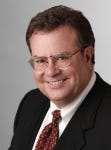Healthcare: Betty Perez RD, University of Medicine and Dentistry of new Jersey—The University Hospital
Director of Food & Nutrition Services The University of Medicine and Dentistry of New Jersey-The University Hospital
John Lawn

Betty Perez
Vivacious, tenacious and passionate about the difference foodservice can make in the hospital environment and the lives of a hospital's patients, staff and guests, Betty Perez is proof positive that team building and team leadership are more important to operational success than financial and facility resources.
As director of food and nutrition services at The University of Medicine and Dentistry of New Jersey — The University Hospital, Perez has spent the last 25 years focused on making foodservice an integral part of the hospital's core business and service culture.
During that time, her team has tripled retail revenues, expanding the hospital's single cafeteria to eight retail points of service. It has also been a period in which the department underwent major staff reductions while picking up additional service responsibilities.
UMDNJ is faced with a city hospital's difficult constraints when it comes to budgets (75 percent of patients are on Medicaid or are uninsured and it provided over $120 million in charity care and $94 million for uncompensated self-pay patients in FY 2008). Perez has relied instead upon grass- roots creativity to develop the department's own brands and concepts.
These range from the unique (for many years, she operated the New Delhi Deli, which offered a combination of Indian vegetarian cuisine and traditional New York deli sandwiches) to the quirky Coup Sisters (a fried wing concept developed by her staff) to the mission-centric Bistro Café, a table service restaurant for hospital staff and their guests. Perez keeps her prices competitive and returns over $300,000 in “rent” to the hospital each year. A strong believer in benchmarking, Perez has also led the hospital in terms of generating high patient satisfaction scores in Press-Ganey evaluations.
Over the years, she's also been a strong supporter of her segment's associations and was recognized in 2007 and 2008 by both HFM and ASHFSA with their Operator of the Year awards. She also spends a tremendous amount of time with her New Jersey colleagues on the board of directors of the Greater New Jersey Society for Healthcare Food Service Administrators.
By all accounts, Perez's greatest achievements have been in the realm of people management, where she is credited with building and motivating diverse teams that have continually exceeded expectations. Not content to simply generate results, she is focused on helping those individuals obtain training, career development opportunities and direction in their lives. It is for these achievements, and the role model she offers to other aspiring directors, that Perez has clearly earned her Silver Plate as IFMA's 2009 Operator of the Year in the Healthcare segment.
I was a floater on my first job as a relief dietitian at New York Hospital. That's where I had my dietetic internship.
I learned how to walk fast — really fast. I went wherever they needed me. One day I would act as a clinical dietitian and the next day I'd be focused on managing food production.
You wore a uniform when you went to work in those days — no pants were allowed! All managers wore a white uniform and white shoes. I had to polish my shoes with white liquid shoe polish and the polish would crack from having so many coats on top of one other.
You have a lot of didactic skills as a dietetic intern, but it is just a warm-up. Then you make the transition to real work situations and have a lot of learning to do. I realized I was more attracted to the hospitality side of the business. I saw you could make a difference with different kinds of clients, staff, visitors and other healthcare team members. I enjoyed the diversity.
I got my permanent job as an administrative senior staff dietitian. That basically meant I was a production manager. It gave me great lessons in management — all the main functions you associate with foodservice management, plus the human relations piece.
Food production was different then. Nothing was computerized. The kitchen had 8-12 sub units. We made ice cream in one. There was a bakery unit, a catering unit, a butcher shop, a vending food unit. I really came to understand the meaning of back-of-the-house and forecasting.
My first big lesson was how important it is to have diplomacy in your leadership repertoire. I was really challenged by the negative disposition of one person on the tray line. I realized I had to make that person more positive so she wouldn't ruin the team dynamics of the others.
One day I'd had enough. I was professional, but I really laid it out for her. I didn't handle it as gently as I should have and I was called into the director's office about that. I learned to be more diplomatic.
I literally flipped the coin when I came to The University Hospital in 1982. My new job was to manage the front of the house as the assistant foodservice director for cafeteria and catering.
I will never forget this. I thought I had these great human relations skills, but as I tried to get to know the employees the first week, it was more challenging than I anticipated. I cried every night on the drive home, I was afraid I'd made a mistake in the biggest career decision of my life.
I learned I had to give myself a chance to adjust to the new environment and build those relationships. When you start a new job there is always a bit of this. I wouldn't trade this talented group for anything today.
The department here was outsourced to a management company when I joined. Although I was a hospital employee, I reported to the contractor's foodservice director. She always encouraged me. She was very clear on the vision of the department and what the responsibilities were. She made us fully accountable for our individual assignments, performance and standards.
She called me in one day. We had a big catering event coming up. and she made me responsible for the whole thing. She told me her vision for it, gave me a budget and told me she'd check on it on the day it occurred to evaluate my performance. It went well, and that was how she taught you accountability.
I thought we could get more aggressive with catering. We had been turning those events down, so I told my supervisors to meet the needs of our client and to build the business. One day we had something like 30 continental events booked. We had them all under control, but my director thought we had overbooked and went ballistic!
I knew my head was on the line. If she got even one complaint it wasn't going to be pretty. I said to my supervisors, “We have to have total perfection.” I knew we could do it and our team performed. After that, the director said to me, “I will never question you again about your plans to grow the business.” I felt we had really earned her respect and recognition.
Our foodservice went self op in 1993. We had a new COO and that's what he wanted. I was the transitional director and every week our transitional team would meet to address every detail. We'd give the COO a weekly update and he would say, “This transition has to be flawless.”
Everyone knew what they had to do. It was a matter of having a good plan and executing. Planning is 95 percent of success, but you need the discipline to follow your plan and still be flexible. If you have a good plan and good people, the people will make it happen.
There are times when you have to let an employee go if they are not dependable or are not meeting performance standards. We try to work with and coach our employees, but ultimately you are responsible for the team. You are all going to either succeed together or fail together, and failure is not an option. That is what I tell my team today.
I believe we won this award because we are constantly innovating in an environment where we have many restrictions on our budgets. We rely on our people instead and on the support of our healthcare executives. I think that what we have been able to achieve in spite of our constraints is really exceptional. In the end, every business is all about people: past, present and forever.
About the Author
You May Also Like




.jpg?width=300&auto=webp&quality=80&disable=upscale)

